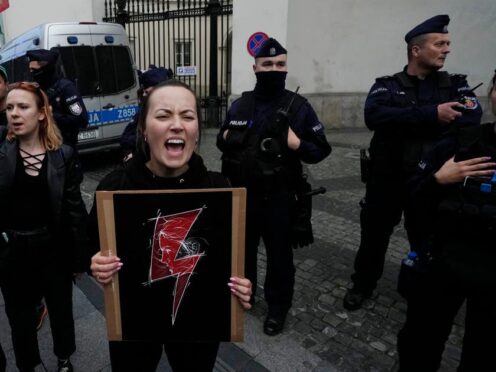
Poland’s parliament is finally holding a long-awaited debate on liberalising the country’s strict abortion law.
The traditionally Catholic nation has one of the most restrictive laws in Europe — but the reality is that many women terminate pregnancies at home with pills mailed from abroad.
Politicians in the lower house of parliament will consider four different proposals on Thursday.
Currently, abortion is regulated by a 1993 law, which was heavily influenced by the Catholic church, and further restricted following a 2020 constitutional court ruling preventing abortion in case of foetal abnormalities.
Prime Minister Donald Tusk, who came to power in December after eight years of a conservative government, has vowed to legalise abortion until the 12th week of pregnancy.
He has said the decision is a woman’s to make, not that of “a priest, a prosecutor or a party official”.

Many Tusk voters hoped politicians would have addressed the matter sooner.
But conservatives in the Town’s three-party governing coalition pushed to keep the hot-button issue off the agenda until last weekend’s local elections were over.
Either way, an uncertain path awaits those who would like to liberalise the law.
Surveys show public support for a more liberal law, but those fighting for the status quo have also mobilised, with an anti-abortion group planning a march through central Warsaw on Thursday afternoon as the debate is under way.
Crucially, conservative politicians hold key political positions with the power to block change.
One is President Andrzej Duda, who holds the veto power over legislation and who already last month vetoed a law that would have allowed over-the-counter access to the morning-after pill for girls and women ages 15 and above.
The other is the speaker of parliament, Szymon Holownia, who had once considered becoming a Dominican friar.
Abortion rights advocates accuse him of violating the will of the voters by keeping the issue off the agenda for months.
“He is a Christian fundamentalist abusing his power as the speaker of parliament,” said Marta Lempart, head of the Women’s Strike, a group that organised mass protests in recent years while the previous right-wing government pushed to restrict abortion rights.
Recalling the record high voter turnout last autumn, when nearly 75% of voters cast ballots, she accused the speaker of “spitting in the face” of all those who turned out to vote.
After what is expected to be a heated debate, politicians will vote on Friday on whether to proceed with the proposals by sending them to a special commission for further work.
Under the current law, doctors in Poland can only provide abortions if a woman’s health or life is at risk or if the pregnancy results from a crime.
However, doctors often will not perform abortions even when they are permissible under the law.
There have been cases in recent years of women with troubled pregnancies who died after doctors prioritised keeping the foetuses alive.
In the case of rape, women have a legal right to abortion if they report the crime to the prosecutor’s office.
In practice, no woman has done so for the past 10 years due to the double stigma of acknowledging the rape publicly and seeking an abortion, said Natalia Broniarczyk, an activist with Abortion Dream Team, one of several groups that help Polish women obtain abortion pills from abroad or travel abroad for the procedure.
“There is no trust in the official system,” she said.
Ms Broniarczyk estimates that there are about 120,000 abortions per year among women in Poland, some 50,000 provided by her group alone.

Enjoy the convenience of having The Sunday Post delivered as a digital ePaper straight to your smartphone, tablet or computer.
Subscribe for only £5.49 a month and enjoy all the benefits of the printed paper as a digital replica.
Subscribe